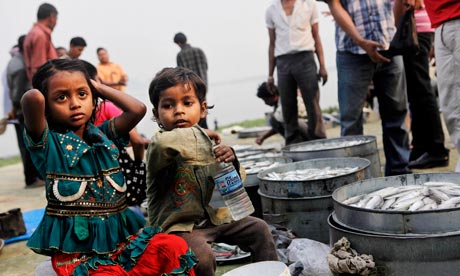http://www.guardian.co.uk/business/2012/apr/11/eurozone-crisis-asian-development-bank-warning

Eurozone crisis now being felt in Asia, warns Asian Development Bank
Growth in China, India and other developing countries hit by weak demand from Europe

A fish market in Gauhati, India. There is a growing wealth gap in developing countries. Photograph: Anupam Nath/AP
Europe's sovereign debt crisis presents the greatest risk to Asian economies in the next 12 months, according to the Asian Development Bank, which fights poverty in the region. The Manila-based lender, which is backed by 67 countries, said in its annual health check of developing Asian economies that policymakers will need to boost spending at home to offset weak demand from Europe.
"The greatest risk to the outlook is uncertainty surrounding the resolution of sovereign debt problems in the eurozone," it said, warning that policymakers must "follow the only half-resolved eurozone debt problems closely, and be ready to act."
The ADB predicted that without a damaging new twist in the euro crisis, the countries it serves – which include China, India and Indonesia – will achieve average growth of 6.9% in 2012, slightly weaker than the 7.2% seen last year.
Joseph Zveglich, the ADB's assistant chief economist, in London to launch the report, said Asian economies accustomed to rip-roaring growth rates in the boom years before the financial crisis must adapt to a new environment: "There is a need to adjust to what is likely to be a long, drawn-out soft patch in terms of the global outlook." He said governments should continue to rebalance their economies away from the export-dominated model of the past model, towards more sustainable consumer demand at home.
The ADB rejects the much-feared idea of a "hard landing" for China, predicting instead that it will chalk up growth of 8.5% this year, and 8.7% in 2013 - weaker than the double-digit rates regularly seen in the decade before 2007, but still robust.
In India, which has long envied China's economic performance, the ADB forecasts growth of 7% in 2012 and 7.5% next year — again, slower than pre-crisis rates.
The ADB also used its annual Outlook to warn that rising inequality across Asia could start to threaten economic development if it is not tackled. "Over the past two decades, Asia has reduced poverty faster than any other region of the world, at any time in history. But the bulk of developing Asia's population lives in countries with rising inequality," the report says.
In the 1990s, China's richest 20% spent five times as much as the poorest fifth of the population, for example; by the 2000s that gap had almost doubled, with the richest fifth spending 9.6 times as much as the poorest.
The ADB warns that this growing gap between rich and poor will eventually start to jeopardise growth, as disadvantaged groups demand political redress and poor workers are left on the sidelines of the economy.
The report urges governments to tackle inequality in three ways: by aiming to create "productive jobs for a wide section of the population;" by improving social inclusion so that access to education, health and other services is not restricted to the rich; and by creating social safety nets to protect the poorest in society.
The ADB also suggests a number of more specific targeted measures, including social payments along the lines of the Bolsa Familia system pioneered in Brazil, which reward parents for ensuring their children attend school.
Tidak ada komentar:
Posting Komentar